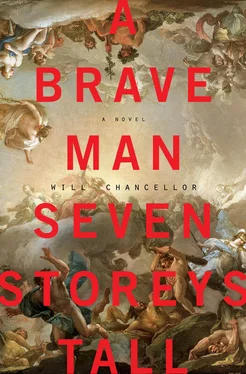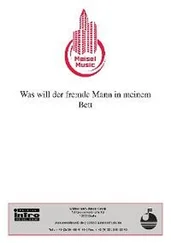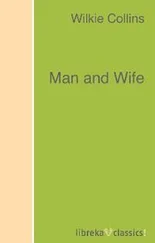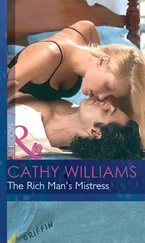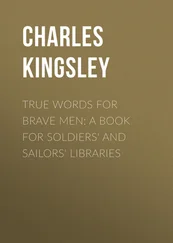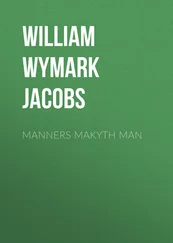
Three months passed with no improvement in Owen’s vision. On the few occasions he tested it, his eye, if you could still call it that, took a soft impression of light. He was aware of light, as a magnet is aware when the wrong pole enters its field. He turned from the sun with the same gentle but steady repulsion. Burr agreed at last that it was time to move on, and drove him to the clinic for the final outpatient procedure.
Four days after his second surgery, in his undersize bed, Owen woke with resolve. He glanced to his clock, hoping for a single digit. A six, an eight, even 9:59 would do. One. The wrong single digit. But it explained the light. Thin winter blue through empty air, not even a dust mote dancing. Or possibly it was just because he needed his left eye to get the oblique angle. He slowly rotated his head, rolling into the thick of a radiating headache. He swallowed a painkiller and went outside for air.
All it took was a nudge of the aluminum frame to open the screen door, stained with salt-wind and hinge-sprung. The sharp dry squeak, a call to the gulls. An onshore breeze held the door closed after Owen passed through.
If he would be going anywhere, this sand would have to go with him.
Owen staggered down the cliff behind his house and over the shale, pooled by the low tide. He crabbed along the rocks until he found his familiar ledge. Leaving his sandals behind, he leapt to the wet sand.
Large dark grains, lifted and crushed by winter’s northern swell, swallowed his toes. At the tidemark Owen poured a cupped hand of ocean onto his brittle yellow hair. A kayaker in the kelp forest, beyond masses of water crumbling at the point, waved a yellow paddle. Owen filled an empty mason jar with dark pumice sand.
And pumice from the shore, the dry porous stone of the sea .
He was used to finding Athene here. Ah-tee-nay, as Owen pronounced it, to his father’s chagrin. She was always around these rocks. Whenever he jumped from the rocks into the cold Pacific, he resurfaced to find her waiting. When she was present, Owen remained submerged to the neck, gripping the rocks to resist the current. She advanced his thoughts farther and along routes that he would not otherwise think of exploring. Dispersed colors condensed until everything cast a shadow of ultramarine. When she was present, everything peripheral vanished. She absorbed it all into her hyperchromatic blue.
That one shade was the text of his private religion. First he saw the color and then he gave it a face and a name. But it was the color that mattered. He met the color here, and it stayed with him for days.
It took Owen years to realize that this belief invited ridicule. In his household, the name Athena, the name Zeus, the name Apollo, were far more common than the name God. When he was very young, his religion had just been a way of matching strange colors to all the stuff his dad was going on and on about. At seven, he thought the gods were something his peers knew existed — because they too knew the names — but couldn’t comprehend, like algebra. At ten, he conceded that faith in the Greek gods would be preposterous, but faith was never the issue. His religion was inductive, grounded exclusively in colors he routinely saw, all with very consistent frequencies. At thirteen, he had faith that the rest of the ancient gods existed, even though he had only seen four. And, yes, he knew he was ridiculous to believe in gods who were extinct.
Respecting his absurd belief was too much to ask of both his peers and their parents. Adults who caught a whiff of Owen’s strange private world thought him fair game because of all his natural advantages. They joked in carpools. They joked in the stands. When his homeroom teacher presented his father with the brewing scandal of Owen qua pagan at third-grade parent-teacher conferences, Burr’s only response was “Of course he’s being ironical. I think we should applaud his sense of humor and knowledge of history.” Owen would never volunteer his idiosyncratic faith to his father, and Burr never raised the issue. Their conversations were limited to calligraphy, Latin, and the injunction to “be a leader, not a follower.”
Still. There was a moment every few days when the light would change, and Owen felt the presence of divinity. Most of his days were steeped in one of these hues, the shades that shouted for a name.
As far as pantheons go, the gods in Owen’s world remained surprisingly few. His palette held four distinct colors — each unique to a divinity, never blended, never diluted, never confused. He experienced one of four precise chromatic shifts. Each bias would last for days. After a decade of collecting paint cards from Home Depot, memorizing a hefty portion of the Pantone scale, writing to everyone from entomologists to geologists to a pen pal in Uttar Pradesh, he had found the conventional, albeit esoteric, names for these colors: peridot, gamboge, carmine, and ultramarine.
But even after that exhaustive chase, the names he’d invented for the colors were the ones he trusted. And ultramarine was Athene.
Athene had watched over his mother, more or less approved of his father, and was the blue mist that surrounded and protected Owen. Before the accident, she raised him above every decision, giving him a privileged topsight.
Now he couldn’t see beyond immediate impediments, and every decision dwarfed him. This nameless world was colorless, collapsed.
The old colors had stained him for days. Nothing could wash one away; it reflected deep into the empty space of his cells. He likened it to a suntan: the light came in, and his body responded. But he kept the experience to himself as long as he could. At age eight he’d watched One Flew Over the Cuckoo’s Nest and learned that words can only hurt you when someone’s questioning your mental health.
It’s tempting to say that Owen was an empty vessel waiting for whatever he chose to call divinity to fill him with heightened thoughts. But no. Light has no volume, and he was no vessel. He was not filled. Light can exert pressure, however. It can lift. And in these washed moments, Owen was lifted to a different height. His body was strengthened, engrafted new. His hands stronger and wiser, his vision clearer.
Christmas 1992 he told his father about it. And that’s when the psychoanalysis started.
Owen’s first therapist was Lacanian. Why Lacanian? His father called psychotherapy “palliative care in drag,” but thought there was real value in learning about Jacques Lacan, the subject of half the dissertations being defended at Mission University. When Burr examined his darker motives, he feared that he was using his son to take lecture notes.
They had trouble locating a Lacanian analyst at all, then trouble finding one willing to take on a preadolescent. Santa Cruz had the man for the job.
In his first session, Owen told his therapist about one of the Gods.
— A flash of peridot at sunset means that Hermes is there. The other colors happen gradually, like the shadow on a sundial. Hermes is like a bomb blast that happens so quickly the walls bend like saw blades and snap back with a warbling like this: wa wa wa waaah .
— What color is peridot exactly?
— It’s exactly peridot. That’s the whole point. It’s a grassy green. Peridot.
— Continue.
— The peridot days are like sculpture or buildings. Like when I see a building in an architecture book, I can put thoughts inside my mental map of the building. Everything fits. But I’m not sure what fits with what; whether the idea comes first or the building. I just sort of let it happen.
— Do you know what a metaphor is?
Читать дальше
